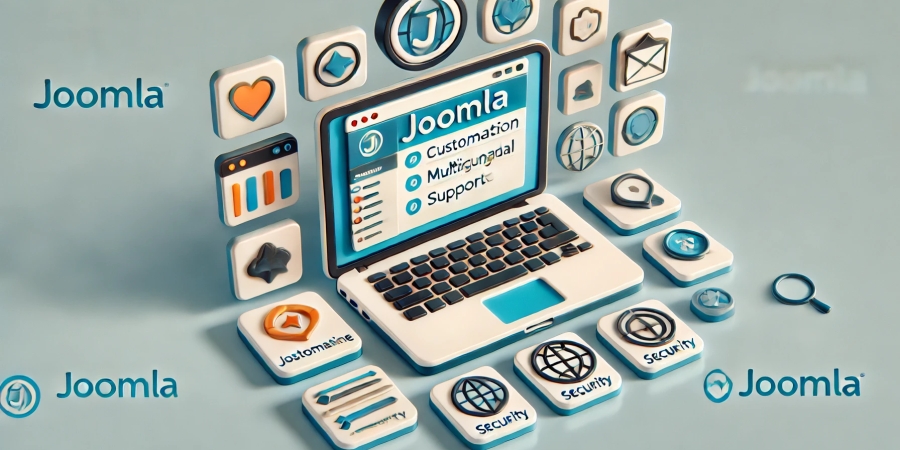When it comes to open-source web content management systems, Joomla is a robust and flexible option that offers an array of features to create, manage, and scale a website with ease. Here’s a look at the outstanding features of Joomla that set it apart from other CMS options.
1. Flexible Content Management and Structuring
One of Joomla’s greatest strengths lies in its flexibility to manage diverse types of content. It uses a three-tiered structure for organizing articles, which includes Categories, Subcategories, and Articles. This structure provides users with the ability to create highly organized content hierarchies, making Joomla suitable for complex websites with vast amounts of information, such as blogs, news portals, and organizational sites.
2. Extensive User Management System
Joomla’s built-in user management system is a standout feature that provides advanced options for access control. It offers a robust ACL (Access Control List), allowing website administrators to set precise permissions for different user groups. This flexibility is crucial for sites where multiple users, from contributors to administrators, need varied levels of access. Compared to other open-source CMS platforms, Joomla’s ACL system is more advanced, providing excellent control for community-driven websites, e-commerce sites, and more.
3. Powerful Extensions and Plugins
Joomla has over 8,000 extensions available through its Extension Directory. These extensions are divided into five major categories: Components, Modules, Plugins, Templates, and Languages. Components are the larger building blocks (like for e-commerce or forums), while modules and plugins offer smaller enhancements and functionality, allowing users to customize their website without requiring extensive coding knowledge. Compared to other CMSs, Joomla provides a unique modular structure, making it easy to add features and functionalities as your site grows.
4. Multilingual Capabilities
With Joomla, there's no need to install additional plugins for a multilingual site. Joomla comes with multilingual support built right into its core, allowing users to create and manage sites in multiple languages efficiently. This feature is beneficial for businesses, global organizations, and multilingual communities that require localized content for their diverse audience.
5. Responsive and Mobile-Friendly Templates
Joomla includes a range of responsive templates that work seamlessly across various devices, from desktops to smartphones. Joomla’s template structure also separates design elements from core functionality, allowing developers to modify the appearance without affecting the site’s overall function. Compared to other CMS platforms, Joomla’s template system is highly flexible, allowing both novice users and seasoned developers to create unique, mobile-friendly designs with ease.
6. SEO-Friendly Structure
Joomla has built-in SEO tools that help improve your website's search engine visibility. Features like customizable meta descriptions, keywords, and SEF (Search Engine Friendly) URLs allow users to optimize content directly. Joomla also allows for easy URL rewriting, providing further customization to make URLs more SEO-friendly. While other CMS platforms require plugins for these capabilities, Joomla’s SEO tools are accessible out of the box, providing an advantage for users focused on organic search performance.
7. Integrated Media Manager
Joomla’s Media Manager is a built-in tool that helps users easily manage media files, such as images, documents, and videos. The Media Manager provides a centralized way to organize and retrieve media, with an intuitive drag-and-drop interface for uploads and categorization options. Compared to other CMS platforms, Joomla's Media Manager is user-friendly and allows for effortless media management without relying on third-party plugins.
8. High-Level Security and Support
As an open-source platform, Joomla is backed by a strong developer community that continually works to improve its security features. Joomla offers two-factor authentication and SSL compatibility, which are vital for protecting user data and ensuring safe interactions on your site. Security updates are regularly rolled out, and the community provides extensive support and resources to address vulnerabilities. This commitment to security gives Joomla an edge over many open-source CMSs, especially for businesses that require a secure digital presence.
9. Active Community and Documentation
Joomla’s community of developers, designers, and users is both active and highly knowledgeable, making it easy to find support, tutorials, and extensions for nearly any need. The Joomla Documentation site is comprehensive and well-organized, covering everything from beginner basics to advanced customization techniques. This active community is a significant asset, as it continuously contributes to updates, security patches, and best practices.
10. Integrated Blogging and E-commerce Options
Although Joomla may not be as widely recognized for blogging as WordPress, it still provides excellent blogging features with categories, tags, and article scheduling options. Furthermore, Joomla integrates with popular e-commerce extensions such as VirtueMart, HikaShop, and J2Store to add online store functionality. This combination of content management and e-commerce solutions makes Joomla ideal for businesses and bloggers looking for a flexible, all-in-one platform.
Conclusion
Joomla’s features make it a powerhouse in the world of open-source content management systems. Its robust content structuring, flexible access control, and wide range of extensions offer something for everyone—from small business owners to large organizations. For those seeking a balance between flexibility and advanced control, Joomla stands out as a versatile and powerful choice. Whether building a multilingual, e-commerce, or community site, Joomla provides the tools needed to create an exceptional user experience and grow with your organization’s evolving needs.
You are a guest ( Sign Up ? )
or post as a guest
Be the first to comment.


